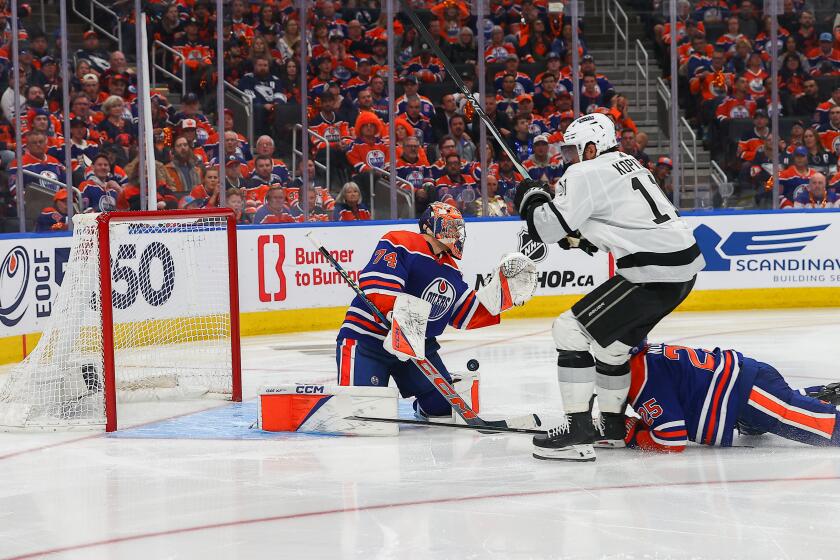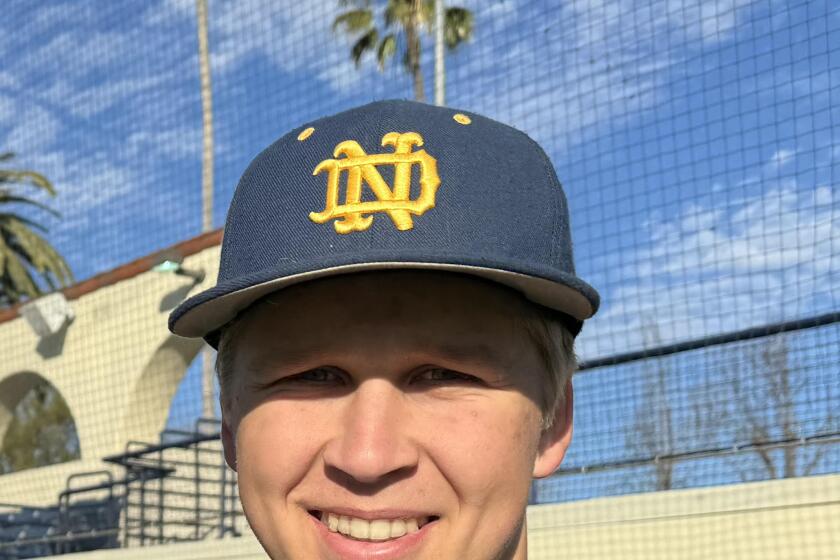Hometown discounts don’t come about often in pro sports
Based on his many conversations with Matt Kemp, agent Dave Stewart said he has a clear idea of what his client is looking for in a long-term deal.
“Winning is important,” Stewart said. “Team chemistry is important.”
And something else: “It’s also important for him to be seen by his peers as one of the best.”
So, what does this mean for the Dodgers, who will attempt to sign their star center fielder to a contract extension this winter?
“This isn’t Matt saying this, this is me saying this,” Stewart said. “But, unfortunately, the way these things are seen is often based on how you’re paid.”
In other words, if the Dodgers intend to retain Kemp beyond the 2012 season when he can become a free agent, they shouldn’t count on a significant hometown discount.
Hometown discounts, in which players remain with their longtime teams or sign with their hometown clubs at less than their market value, are becoming increasingly rare in baseball and other professional sports.
“I think it’s walked step by step with the increase in salaries,” said Dodgers General Manager Ned Colletti, who has spent more than three decades in baseball.
Whereas a hometown discount in the past often meant leaving tens of thousands of dollars on the table, doing so today could cost a player millions.
But it does happen.
By agreeing to a five-year, $85-million contract extension with the Angels in August, pitcher Jered Weaver passed on the opportunity to sign a nine-figure deal as a free agent after the 2012 season.
“There’s no better fit than to stay here,” Weaver said at the time.
Weaver grew up in Simi Valley, pitched at Long Beach State, was drafted by the Angels in 2004 and has spent his entire professional career in the organization.
Six-time Pro Bowl safety Troy Polamalu said he felt similarly toward the Pittsburgh Steelers. In a league filled with mercenaries who switch teams with great frequency, Polamalu has spent his entire nine-year career with the same franchise.
A season away from free agency, Polamalu signed a four-year extension with the Steelers last month. He is under contract through 2014.
“There’s a lot of loyalty here,” Polamalu said. “With that, you have consistency. You have a deep understanding of the system and you don’t have so many ego problems. It’s not like the adopted brother that comes in when everybody’s in high school and the family is set in its ways.”
Still, the Steelers had to pay him top dollar. Polamalu is one of the league’s highest-paid defensive backs.
A player might take less to stay with the same team, Colletti said, but not that much less.
“It’s got to be relatively close,” Colletti said.
Until its collective-bargaining agreement expired, the NBA had a mechanism in place to limit the movement of its top players. “The Larry Bird exception,” named after the Boston Celtics’ Hall of Fame forward, allowed teams to exceed the salary cap to re-sign their own free agents.
In the NFL, a team can retain a would-be free agent by designating him with a “franchise tag.” The tag binds the player to the team for the upcoming season. In exchange, the player is guaranteed to earn 120% of his salary from the previous season or the average salary of the top five earners at his position in the league.
But top-tier NFL players rarely reach free agency in the primes of their careers. Many sign multi-year deals before then because players fear potential injuries and teams fear losing their top talent in the open market.
Many Major League Baseball teams and players are employing the same tactics.
Entering his second big league season, in 2008, Ryan Braun tied himself to the Milwaukee Brewers through 2015. The extension, which bought out Braun’s first two years of free agency, was worth $45 million. Braun signed another extension in March, this one for an additional $105 million that bound him to the Brewers through at least 2020.
Chad Billingsley also exchanged the potential upside of free agency for guaranteed money. Shortly before opening day this year, the right-hander anchored himself to the Dodgers through at least the 2014 season. The deal includes a team option for 2015, meaning Billingsley could have signed away his first three years of free agency.
Like Kemp, Billingsley is represented by Stewart, a former major league All-Star pitcher.
But that doesn’t mean Stewart is pushing Kemp to sign a below-market deal for the sake of security.
“The timing is what makes this different,” Stewart said.
The Dodgers had Billingsley under club control for two more seasons when they signed him to his extension. Kemp will be a free agent after only more season.
“Matt is arguably the best player in the game at this age,” Stewart said. “He’s a special hitter. He hits with power. He plays a special position. His potential is upward. He plays every day. There’s no reason to think anything negative is going to happen.”
Times staff writers Sam Farmer and Broderick Turner contributed to this report.
More to Read
Get our high school sports newsletter
Prep Rally is devoted to the SoCal high school sports experience, bringing you scores, stories and a behind-the-scenes look at what makes prep sports so popular.
You may occasionally receive promotional content from the Los Angeles Times.






